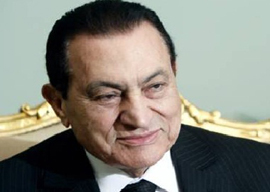
February 04, 2011

Hosni Mubarak
And though Washington appears to have cut him loose to appease the crowds the White House now sees as the future of Egypt, Mubarak has sturdier allies in Israel and Saudi Arabia. Across the Middle East, monarchs and autocrats must be urging Mubarak to quash the revolution and prevent its spread to their own countries, as it has spread to Jordan and Yemen.
Mubarak has another advantage.
He is an old man—perhaps a sick man close to death—but a soldier with a sense of honor, who has spent his life in his country’s service. And he is no coward. When he says: “I have lived for this country. I have fought for it. … I will die on this land,” one ought to take him seriously.
Moreover, he knows that if he abdicates and flees, he goes into history with Ferdinand Marcos and the Shah as a despot and absconder who will be remembered for having let himself be run off by the crowd.
Only if he survives this challenge of the streets—as Charles De Gaulle survived the student riots of 1968, as Richard Nixon survived the mammoth antiwar riots and demonstrations of 1969 by calling on the Silent Majority to stand by him—can Mubarak hope to maintain his place in the history of modern Egypt.
My sense: Mubarak is determined he will be seated as president on the inaugural stand when the next Egyptian president is sworn in, and the crowd in Tahrir Square lacks what it takes to deny this to him.
But what must Mubarak think of us?
He stood by us through the final Reagan decade of the Cold War. At George H.W. Bush’s request, he sent his soldiers to fight alongside ours against fellow Arabs in Desert Storm. He stayed faithful to a peace with Israel his people detested. He cooperated with George Bush II in some of the nastier business of the War on Terror.
A dictator, yes, but also our man in the Arab world. Yet a few hundred thousand demonstrators in Cairo’s streets caused us to abandon him.
In the last half-century, how many others who cast their lot with us have we abandoned as “corrupt and dictatorial” when they started to lose their grip? Ngo Dinh Diem, Gen. Thieu and Marshal Ky, Lon Nol, Chiang Kai-shek, Marcos, the Shah, Somoza, Pinochet—the list goes on.
When we needed them, they were hailed as America’s great friends. When they needed us, we abandoned them in the name of our rediscovered democratic values.
“In this world, it is often dangerous to be an enemy of the United States,” said Henry Kissinger, “but to be a friend is fatal.”
Hosni Mubarak must be thinking something like that today.